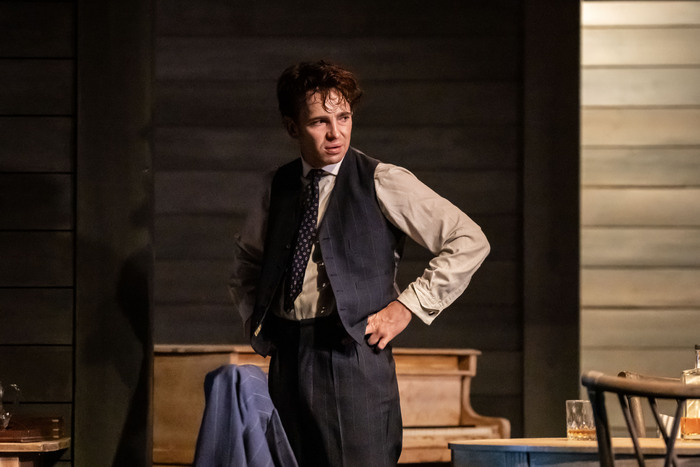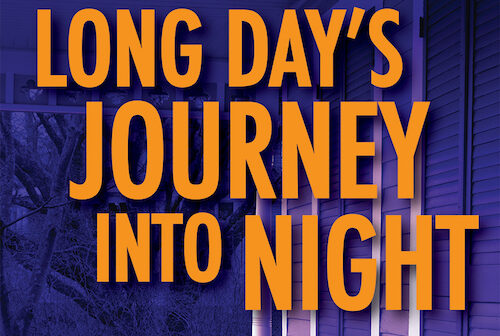By Katerina Taxiaropoulou,
“Be always drunken. Nothing else matters: that is the only question. If you would not feel the horrible burden of Time weighing on your shoulders and crushing you to the earth, be drunken continually.
Drunken with what? With wine, with poetry, or with virtue, as you will. But be drunken.”
― Eugene O’Neill, quote from Long Day’s Journey into Night
As discussed in the first part of this article, Mary Tyrone has been suffering from morphine addiction since the birth of her youngest son, which was followed by immense pain, and painkillers were offered to her irresponsibly by a cheap doctor. Beyond the technical initiation point, however, one should also consider the miscarriage she went through before that and post-partum depression. According to the official site of Cleveland Clinic, there is a “strong link between addiction and mental health conditions” that can justify an individual’s chronic dependance from a substance with analgesic or euphoric effects (Addiction). Having neglected his wife when she needed most of his love and care, James Tyrone now has to live with a ghost of a woman. And because he cannot bear it, he turns to alcohol. What about his children though? How are they supposed to stand on their own feet when their parents are barely functional?
2. The Children

As young children, Jamie and Edmund were deprived of affection, care, and safety. Most of the time, their mother was emotionally absent because of her morphine addiction. Their father was literally absent because of his job as a touring actor. They also did not have a stable home. Instead, they lived in dirty hotel rooms, as Mary keeps saying. Despite their very different personalities, they both tried “escaping from their bitter reality” (ELS Journal). One chose alcohol and prostitutes, while the other chose the navy.
Jamie, the older son, is an actor like his father, but cannot find a job because of his reputation as an irresponsible, womanizing alcoholic. He is attractive and has a habitual expression of cynicism on his face. As critics claim, Jamie “could not bear” the fact that his loved ones were suffering and so “he tried to escape from his painful reality by destroying his own health and future” (ELS Journal). To the greatest part of the play, he comes off as insensitive to the feelings of others. He never sugarcoats the reality of his mother’s addiction and he is the first one to issue accusations for the family’s problems.
Behind this attitude, however, hides a deeply hurt and angry boy. Unlike his brother who was a baby, Jamie witnessed the deterioration of Mary’s health, her immense pain, as well as the start of her addiction. It is quite possible that his inner child blames himself for not being able to stop it. Thus, as an adult, he resorts to alcohol to forget this guilt. According to experts, “adverse childhood experiences (ACEs) also play a role in the development of addiction” (Addiction). And the more he drinks, the more he says things he does not mean, hurting himself and others:
[To EDMUND]
“JAMIE: What I wanted to say is, I’d like to see you become the greatest success in the world. But you’d better be on your guard. Because I’ll do my damnedest to make you fail. Can’t help it. I hate myself. Got to take revenge. On everyone else… The man was dead and so he had to kill the thing he loved. That’s what it ought to be. The dead part of me hopes you won’t get well. Maybe he’s even glad the same has got Mama again! He wants company, he doesn’t want to be the only corpse around the house!”
― Eugene O’Neill, quote from Long Day’s Journey into Night

The youngest son, Edmund, is the only member of the family who does not struggle with addiction. He is intellectually and poetically inclined, but, unlike his brother and father, he did not wish to take up the arts professionally. Instead, he chose to work in the navy and travel around the world. This career path was a means for him to escape his problematic family, especially his mother whose suffering he could not endure. However, it cost him his health, as it was onboard where he contracted tuberculosis. In the navy, he “lived happily enjoying his life, achieving his dream” without “the worries and the problems that surround him now” (ELS Journal). In the navy, he felt like himself.
Before Edmund, Mary Tyrone gave birth to another child named Eugene, who died of measles when it was a baby. As a result of this tragic event, Edmund grew up with the idea that he was never meant to be born. That is why he now seems to “lack the sense of belonging to his family and… to the universe as a whole” (ELS Journal). To his mind, it appears as if tuberculosis came to restore things back to order.
“EDMUND: It was a great mistake, my being born a man, I would have been much more successful as a sea gull or a fish. As it is, I will always be a stranger, who never feels at home, who doesn’t really want and is not wanted, who can never belong, and who must always be a little in love with death”
― Eugene O’Neill, quote from Long Day’s Journey into Night
At last, what makes this play so powerful is the deeply felt tragedy of its story. In this long day’s journey into the night, James, Mary, Jamie and Edmund Tyrone cross over each other’s pains and failures, abdicating responsibility and issuing accusations for facts that can no longer be altered. And it is tragic because one can see that there is “a great deal of love” among the four, love that their personal weaknesses do not allow them to express and hence feel (Yale University Press).
So, they remain stuck living the same day, unable to go back, unable to move forward. They can only escape for a moment by means of drugs and alcohol. But this makes their present even worse. If there is any moral Long Days Journey into Night has to teach, this is to face one’s own guilt and forgive oneself for it. Only then will one be able to forgive others and find peace.
References
- Escapism in Eugene O’Neill’s Long day’s Journey into Night. journal.unhas.as.id. Available here
- LONG DAY’S JOURNEY INTO NIGHT. faculty.webster.edu. Available here
- Eugene O’Neill + Long Day’s Journey into Night. kennedy-center.org. Available here
- Addiction. my.clevelandclinic.org. Available here




